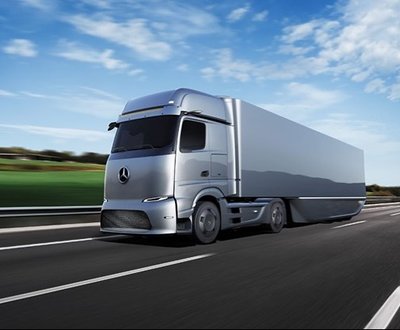Heavy-duty truck production dates, range and powertrain expectations detailed.
Daimler has thrown down its electric truck gauntlet with an electrification technology strategy and path to heavy-duty production.
Despite the names, the move reinforces the divide between fuel-cell and battery electric functions, with batteries likely to have more regional or urban tasks in an Australian setting.
In the spotlight are two Mercedes-Benz models that have already been revealed: the GenH2 Truck and the eActros plus its LongHaul variant.
The former is the distinctive fuel-cell truck – Daimler giving it a range of up to 1,000km-plus "for flexible and demanding long-haul transport" – with customer trials in 2023, start of series production in second half of this decade.
The eActros LongHaul, a battery-electric truck with a range of about 500km, "for energy-efficient transport on plannable long-haul routes" – is aimed at series production in 2024.
The event on September 16 had a European focus but with implications for other markets clear but details to be developed, particularly for Australia.
"Daimler is already the go-to choice for progressive Australian businesses who want to reduce fuel consumption and cut emissions with trucks that employ class-leading safety features," Daimler Truck and Bus Australia Pacific president and CEO Daniel Whitehead says.
"The Freightliner Cascadia, Mercedes-Benz Actros and Fuso Shogun all feature Euro 6 or equivalent emission-level engines and we will also introduce the all-electric Fuso eCanter here next year.
"The new models previewed in Berlin, including a CO2-neutral heavy truck with up to 1,000km of range, are especially exciting for Australia and point to a very promising future."
The strategy foresees the Mercedes trucks, including the low-floor eEconic, and Daimler’s electric propelled US models, such as the medium-duty Freightliner eM2 and the heavy-duty Freightliner eCascadia, underpinned by the modular ePowertrain, regardless of propulsion option.
There will also be an analytical component to support the business case.
Daimler Trucks will embed the vehicle in a holistic ecosystem that includes consulting services for electric mobility, such as analysing routes, checking possible subsidies, supporting operational fleet integration and developing suitable charging-infrastructure solutions," the company says.
Daimler Truck chairman Martin Daum sees the propulsion dichotomy as having the "potential to succeed in the market in the long term".
"This combination enables us to offer our customers the best vehicle options, depending on the application.
"Battery power will be rather used for lower cargo weights and for shorter distances. Fuel-cell power will tend to be the preferred option for heavier loads and longer distances.
"Our customers make rational purchasing decisions and are unwilling to compromise on their trucks’ suitability for everyday use, tonnage and range.
"With our alternative drive concepts from Mercedes-Benz – the GenH2 Truck, the eActros LongHaul and the eActros – and our electric trucks of the Freightliner and Fuso brands, we have a clear focus on customer requirements and are creating genuine locally CO2-neutral alternatives for them.
"We have now set out the key technological specifications of our electric trucks so that the requirements are known to everyone involved at an early stage. It is now up to policymakers, other players and society as a whole to provide the right framework conditions.
"To make CO2-neutral all-electric vehicles competitive, regulatory and government action is needed, including the necessary infrastructure for charging with green electricity and for the production, storage and transport of green liquid hydrogen."
While political backing is seen as crucial to the initiative’s European success, the figures will likely decide Australian acceptance.
The series-production version of the GenH2 Truck is to have a gross vehicle weight of 40 tonnes and a payload of 25 tonnes.
"Two special liquid-hydrogen tanks and a particularly powerful fuel-cell system will make this high payload and long range possible, and therefore form the core of the GenH2 Truck concept.
In a pre-series version, two electric motors are designed for a total of 2 x 230kW continuous power and 2 x 330kW maximum power. Torque is 2 x 1,577Nm and 2 x 2,071Nm respectively.
Daimler sees the eActros LongHaul in similar terms.
"Its features will be largely identical to those of the series-produced GenH2 Truck or a conventional diesel truck," it says with a view to its European practicalities.
"The comparatively short range of the eActros LongHaul on one battery charge is offset by its high energy efficiency, as battery electric drive has the highest efficiency among alternative drive systems."
It’s sibling, the eActros, is promised to be "significantly superior" to the prototype unveiled in early-2018 – on a par with a conventional Actros for payload and will be "launched as a two-axle and three-axle truck".


